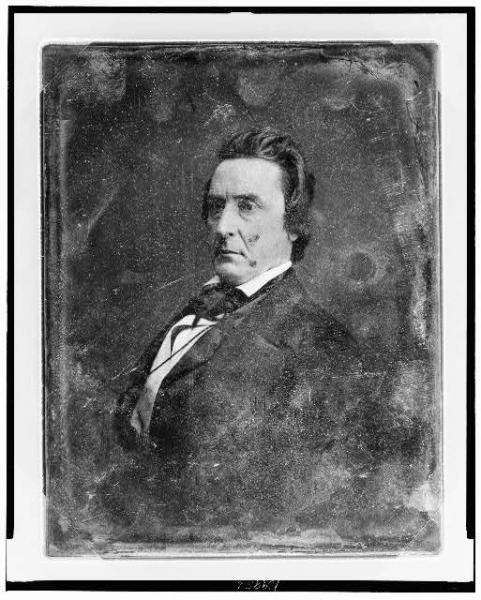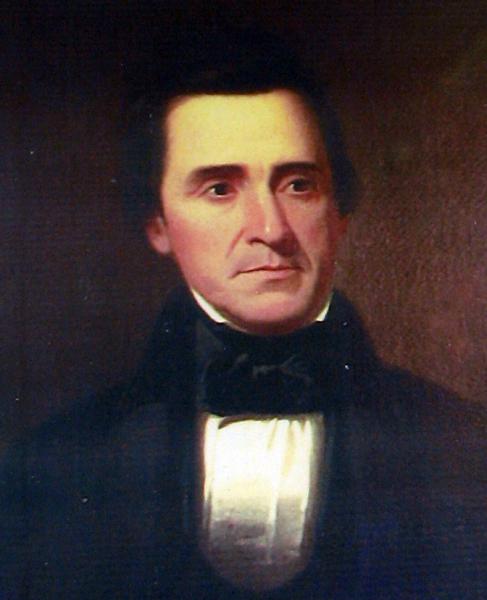By Zach Garrison, University of Cincinnati
Biographical Information:
- Date of birth: August 11, 1807
- Place of birth: Frogtown (now Lexington), Kentucky
- Claim to fame: Border Ruffian; Missouri Senator, 1844-1855; President pro tempore of U.S. Senate, 1846-1849, 1852-1854; General in the Missouri State Guard, 1861-1862; "President for One Day," March 4, 1859; namesake of Atchison County, Kansas, and Atchison County, Missouri
- Political affiliations: Democratic Party
- Date of death: January 26, 1886
- Place of death: Gower, Missouri
- Final resting place: Greenlawn Cemetery, Plattsburg, Missouri
A proponent of westward expansion and a prominent proslavery Democrat in the state of Missouri, David Rice Atchison led the call for slavery’s extension into the Kansas and Nebraska territories. Following the passage of the divisive Kansas-Nebraska Act in 1854, Atchison directed efforts of Missourians to cross the border in order to stuff ballots during Kansas’ first territorial election in 1855 and personally led Missouri “border ruffians” in their often-violent efforts to secure Kansas as a slave state, including an attack on Lawrence, Kansas, in 1856.
A proponent of westward expansion and a prominent proslavery Democrat in the state of Missouri, David Rice Atchison led the call for slavery’s extension into the Kansas and Nebraska territories.
Atchison spent his youth in Lexington, Kentucky on his family’s plantation, later apprenticing as a lawyer after attending Transylvania University. Seeking to establish himself in the West, Atchison moved to Liberty, in Clay County, Missouri. A slave owner and vocal Democrat, he was elected as a Missouri State Representative in 1834 and U.S. Senator in 1843. Atchison’s popularity and influence in the Democratic Party led to his election as the Senate’s president pro tempore in 1845 at the age of 38, after serving only two years as a senator.
Amidst growing sectional tension, Atchison found himself at odds with Missouri’s leading politician, Thomas Hart Benton. Benton, a prominent Jacksonian Democrat, sought to break his party’s ties with the South and prevent slavery’s expansion into new Western territories. Benton lost the support of many Missourians who resided along the Missouri River Valley, where hemp production, which relied heavily on slave labor, reigned. Quick to pick up the pieces, Atchison built upon the disaffection and arrived in Washington, D.C. as the West’s leading Democrat, where he quickly built a proslavery coalition intent on securing the Kansas and Nebraska Territories for Southern migrants and their slaves.
Atchison set aside his attempt for reelection and focused instead on proslavery migration into Kansas.
When it became clear in 1855 that the Missouri-Kansas border would become a point of bloody conflict, Atchison set aside his attempt for reelection and focused instead on proslavery migration into Kansas. Gathering a group of riders, the politician led a number of raids into Kansas in hopes of intimidating Free-Soil and antislavery foes, culminating in the 1856 attack on Lawrence, Kansas.
In the 1860 gubernatorial election, Atchison threw his support behind the successful campaign of proslavery Democrat Claiborne Fox Jackson and publicly endorsed Missouri’s secession from the Union. This short-lived victory on the state level, however, was followed by a defeat in the West. Despite the endeavors of the border ruffians, Kansas entered the Union on January 29, 1861, as a free state.
After witnessing the violence in Kansas, Atchison saw the writing on the wall and retired permanently from political office to await the impending crisis. Once federal forces secured the state, Atchison, along with Governor Jackson, fled south. Atchison eventually made his way to Texas, where he remained for the duration of the war. He returned in 1867, eschewing politics completely and instead choosing a quiet life on his farm in western Missouri, until his death on January 26, 1886.
Atchison also gained a measure of fame from speculation that, through a technicality, he may have served as “president for a day.” During his tenure as the Senate’s president pro tempore, outgoing President James K. Polk officially left office at noon on Sunday, March 4, 1849. Zachary Taylor, incoming president-elect, refused to proceed with the official swearing in on a Sunday, while Taylor’s vice president, Millard Fillmore, had yet to be inaugurated. Atchison himself never accepted the title (after all, just like Taylor and Fillmore, Atchison was not sworn into the office, and his office of president pro tempore actually expired at the same time that Polk’s presidency ended). Atchison was never officially recognized as “president for a day.” Still, the misconception stuck and remains a part of his legacy alongside his proslavery activities on the Western border.
Suggested Reading:
Monaghan, Jay. Civil War on the Western Border, 1854-1865. Boston: Little, Brown, 1955.
Oertel, Kristen Tegtmeier. Bleeding Borders: Race, Gender, and Violence in Pre–Civil War Kansas. Baton Rouge: Louisiana State University Press, 2009.
Parrish, William E. David Rice Atchison of Missouri: Border Politician. Columbia, MO: University of Missouri, 1961.
Cite This Page:
Garrison, Zach. "Atchison, David Rice" Civil War on the Western Border: The Missouri-Kansas Conflict, 1854-1865. The Kansas City Public Library. Accessed Friday, April 19, 2024 - 06:11 at https://civilwaronthewesternborder.org/encyclopedia/atchison-david-rice



